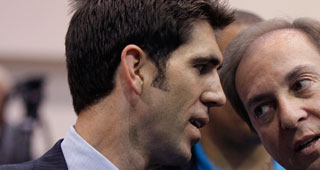Considering how much has happened for the Golden State Warriors over the past 24 months, December of 2011 seems like an awfully long time ago. Just think about the structure of the organization- Bob Myers had come on in April of that year as an assistant general manager (Larry Riley was still the GM and Jerry West came into the fold in the spring of 2011 like Myers) but the team played its last game of the season and then had to deal with the lockout. The Warriors drafted Klay Thompson, Jeremy Tyler and Charles Jenkins in June but interactions with team officials including coaches were severely constrained during the lockout months.
On December 8, 2011, the players and owners ratified their new collective bargaining agreement, so the league’s doors opened up again on the ninth. The three days following that continue to have big ripple effects on the organization.
The strange timing of the lockout and its resolution allowed for some news to be made during the few days leading up to the actual start of league business. For the Warriors, this centered on a pursuit of both Chris Paul via trade from the New Orleans Hornets and his former teammate Tyson Chandler as a free agent. While the team was openly hopeful to land Chandler, he committed to joining the New York Knicks on December 8th, leaving the Warriors in somewhat of a lurch but also giving them additional flexibility since Tyson made his choice before binding decisions had to be made on other players and trade possibilities.
With Chandler off the board, Golden State took Stephen Curry off the table in negotiations for Chris Paul, effectively taking them out of the conversation even after David Stern nixed the deal to the Lakers.
Those disappointments set the stage for an important short stretch between the ending of the functional moratorium and the start of the shortened post-lockout season.
December 9th
The previous morning, Charlie Bell showed up to a pre-scheduled hearing in Michigan about his October DUI arrest legally drunk. The team put out a small statement of concern but left further comment for later.
On the first day of free agency, the organization identified DeAndre Jordan as their new primary target. Unfortunately, Jordan was a Restricted Free Agent, meaning the division rival Los Angeles Clippers retained the right to match any and all offers he could sign with other NBA franchises. The Warriors assessed that they would need more cap space in order to make an offer the Ciippers might not match and at worst costs them more money per season.
The first move in this process was waiving guard Jeremy Lin on December 9th. The Harvard graduate grew up in the Bay Area and actually knew owner Joe Lacob’s son (and current assistant general manager) Kirk from that time. An exceedingly popular player despite only playing 285 regular season minutes with the team, Lin had a non-guaranteed contract for the 2011-12 season. I have written about the stupidity of this move previously, but the gist is that the team cut an incredibly hard worker with a moderately high ceiling before even seeing him practice or work out once after the lockout to gain a whopping $272,015 on the first year offer to Jordan. While he did get cut from Houston before exploding later that season with the Knicks, the Warriors would have had the ability to match any offer for Lin if Linsanity had come in a Golden State uniform and secured him at an even cheaper price if it had not.
They also signed second round pick Charles Jenkins.
December 11th
The Warriors still had to generate more salary cap space in order to make the offer they wanted for DeAndre Jordan and that took a few steps.
First, they withdrew their qualifying offer to Restricted Free Agent guard Reggie Williams. The swingman had played in 104 games over the past two seasons with the Warriors, averaging 20.3 minutes per game in 2010-11. Taking his qualifying offer off the books made him an unrestricted free agent and he signed with Charlotte for two years and $5.11 million a few days later.
Second, they turned around and used their one-shot amnesty provision on Charlie Bell, who had one year and $4.1 million remaining on his contract. Keep in mind that the team still had to pay Bell his salary- it just took his final year off the books in terms of the salary cap.
Later that day, the Warriors signe Jordan to a four year, $43.04 million offer sheet despite Jerry West saying that day that he was “just not really sure about him.” Regardless, the Clippers matched the offer sheet the following day, not even waiting the full time period.
In just three days, the organization had cut bait on two potential assets with limited salary commitments and burned their one amnesty under the brand new CBA to offer an overly expensive contract to a player whose team matched it anyway as everyone expected. Over the following week, most of Jordan’s $10.1 million first year salary partially created by the cuts went to a one-year, $6.75 million contract for Kwame Brown.
Brown played reasonably well in nine games as a Warrior before getting hurt and ended up being moved as injured cap filler in the Monta Ellis/Andrew Bogut trade later in the season. The only other player given more than the minimum that offseason was second round pick Jeremy Tyler, who signed for three years, $2.3 million.
Now, none of this is here to make fun of what happened or mock the front office for a series of terrible decisions in a short period of time. Management and the team itself rebounded well from this disastrous stretch by trading Lou Amundson for Brandon Rush, moving Monta Ellis for Andrew Bogut later that season, and tanking to end up with Harrison Barnes within six months, all steps which directly helped lead to the success that followed.
Rather, the lesson here is that missteps at any point in the process end up affecting franchises for shockingly long periods of time. Fortunately, most can be overcome with better decisions and some luck. After all, the Rockets nearly lost some of what became the key pieces in the James Harden trade when Stern vetoed the Paul deal, which would have netted a weaker long-term asset in Pau Gasol, and the Cavaliers ended up with Kyrie Irving because the Clippers somehow did not demand at least top-3 protection they easily could have gotten in a salary dump. Things like that happen but short-sighted moves like cutting Lin and using the amnesty on Charlie Bell made the quality team currently on the floor a tougher task to accomplish.



